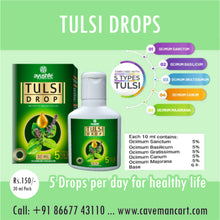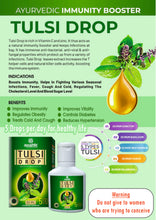Research-Backed Benefits of Tulsi are:
1. Natural Immunity Booster:
Tulsi is rich in Vitamin C and zinc. It thus acts as a natural immunity booster and keeps infections at bay. It has immense anti-bacterial, anti-viral and anti-fungal properties which protect us from a variety of infections. Tulsi leaves extract increases the T helper cells and natural killer cells activity, boosting the immune system.
2. Reduces Fever (antipyretic) & Pain(analgesic):
Tulsi has anti-bacterial and anti-viral properties which help to fight infections, thus reducing fever. The fresh juice of Tulsi taken with black pepper powder cures periodic fevers. Tulsi leaves boiled with powdered cardamom (elaichi) in half a litre of water and mixed with sugar and milk, are also effective in reducing temperature.
Eugenol, a terpene with pain-relieving properties found in Tulsi reduces aches in the body.
3. Reduces Cold, Cough & Other Respiratory Disorders:
Camphene, cineole and eugenol present in Tulsi help reduce cold and congestion in the chest.
Juice of Tulsi leaves mixed with honey and ginger is effective in bronchitis, asthma, influenza, cough and cold.
4. Reduces Stress & Blood Pressure:
Tulsi contains compounds Ocimumosides A and B. These compounds reduce stress and balance the neurotransmitters serotonin and dopamine in the brain. The anti-inflammatory properties of Tulsi reduce inflammation and blood pressure.
5. Anti-cancer properties:
Phytochemicals present in Tulsi have strong antioxidant properties. Thus, they help in protecting us from skin, liver, oral and lung cancers.
6. Good for Heart Health:
Tulsi has a profound effect on the treatment and prevention of cardiovascular diseases by lowering blood lipid content, suppressing ischemia and stroke, reducing hypertension and also due to its higher antioxidant properties.
Read more about tips for a healthy heart.
7. Good for Diabetes Patients:
Extract of Tulsi leaves has shown to lower blood glucose levels in patients with type 2 Diabetes.
8. Useful in Kidney stones & Gouty Arthritis:
Tulsi detoxifies the body and has diuretic properties. It decreases the level of uric acid in the body, which is the main reason why kidney stones are formed. Reduction in uric acid levels also provides relief to patients suffering from Gout.
9. Useful in Gastrointestinal Disorders:
Tulsi leaves help to cure indigestion and loss of appetite. They are also used for the treatment of flatulence and bloating.
10. Good for Skin & Hair:
Tulsi helps clear out the skin of blemishes and acne. It is rich in antioxidants and that helps it to prevent premature ageing. Tulsi also strengthens our hair roots, thus preventing hair loss.
The antifungal properties of Tulsi prevent the development of fungus and dandruff.
11. Acts as an Insect Repellent:
For centuries, the dried Tulsi leaves have been mixed with stored grains to repel insects.
12. Insect Bites & Blood Purification:
Apart from simply repelling insects, the extracts of Tulsi leaves can also be applied to insect bites and stings to ease the pain. They also reduce swelling or resultant irritation to a great extent. Moreover, daily consumption of Tulsi also helps to purify the blood.
13. Oral and Dental Health:
Tulsi has often been used in herbal toothpaste and that is simply because of its amazing teeth and gum strengthening properties. Moreover, it can act on mouth ulcers and therefore provide comprehensive oral health care.
14. Treatment of Eczema:
Tulsi is also available commercially in the form of ingestible pills and topical ointments. These can be used for the treatment of skin conditions like eczema. They also provide long-lasting relief from itching and irritation.
15. Reduces Stress & Fatigue:
Research has also shown that Tulsi has several physical and mental health benefits. For instance, consuming a tulsi drink after a tiring day at work can be revitalising and help to relieve stress and fatigue. Similarly, a tulsi drink during prolonged hours of study can also help to enhance concentration for students.
Side Effects of Consuming Tulsi That You Must Know:
- Tulsi may affect the reproductive capacity of women who are trying to conceive.




